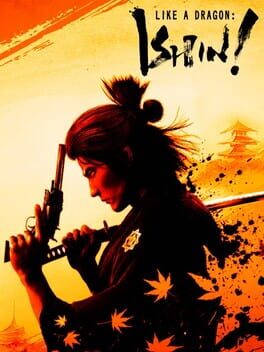Like A Dragon: Ishin! set a personal benchmark for "cinematic storytelling." Ishin, like many RPGs, is dialogue heavy and dramatic. However, Ishin also has a clear understanding of mise-en-scène and cinematography. Ishin uses cinematics to enhance inherently passive conversations. Eleven hours of cutscenes sounds like hell, but the camerawork and editing and lighting is so tight that despite having literally no way to interact with them, I was still glued to the screen. A lot cutscenes feel like they are there as a replacement to gameplay, like the developers could not find a way to tie the action to interaction. In this case, Ishin makes the best of it and instead relies on conventional filmmaking techniques with its camera moves and editing to still give the dialogue an added layer of urgency and, in turn, making the transition between flashy combat and melodrama more tonally consistent.
When the game is not in heavy dialogue revealing the sixtieth plot twist of the second chapter, it is still great. The combat, although the highlight of RGG games, feels rigid and bordering on outdated. The systems and location surrounding the combat feel a whole lot more polished. For one, the world, a miniature Kyo, is perfectly sized. The city is just big enough that it manages plenty of geographic diversity, but also small enough that I was able to naturally learn my way around. By the time the full map was revealed, I could be told where to go and know how to get there without relying on the minimap or fast travel. This allowed for me to experience a lot more side quests. I am mixed on the mandatory interruption when triggered, but they are usually short enough that they make for welcome breathers. The best part of the city is the sound: there is always a light buzz of conversation. Whether that be overhearing actual conversations or just running down the main streets with the sounds of people and food, Ishin captures the intimacy of cities more accurately than most games.
Like a Dragon: Ishin! does an exceptional job of justifying why medium sized (by RPG standards) games need to exist. Ishin has a respectable scope, but by having a thorough understanding of film grammar and city design, Ishin still lets me get lost in conflict and farming.
When the game is not in heavy dialogue revealing the sixtieth plot twist of the second chapter, it is still great. The combat, although the highlight of RGG games, feels rigid and bordering on outdated. The systems and location surrounding the combat feel a whole lot more polished. For one, the world, a miniature Kyo, is perfectly sized. The city is just big enough that it manages plenty of geographic diversity, but also small enough that I was able to naturally learn my way around. By the time the full map was revealed, I could be told where to go and know how to get there without relying on the minimap or fast travel. This allowed for me to experience a lot more side quests. I am mixed on the mandatory interruption when triggered, but they are usually short enough that they make for welcome breathers. The best part of the city is the sound: there is always a light buzz of conversation. Whether that be overhearing actual conversations or just running down the main streets with the sounds of people and food, Ishin captures the intimacy of cities more accurately than most games.
Like a Dragon: Ishin! does an exceptional job of justifying why medium sized (by RPG standards) games need to exist. Ishin has a respectable scope, but by having a thorough understanding of film grammar and city design, Ishin still lets me get lost in conflict and farming.
